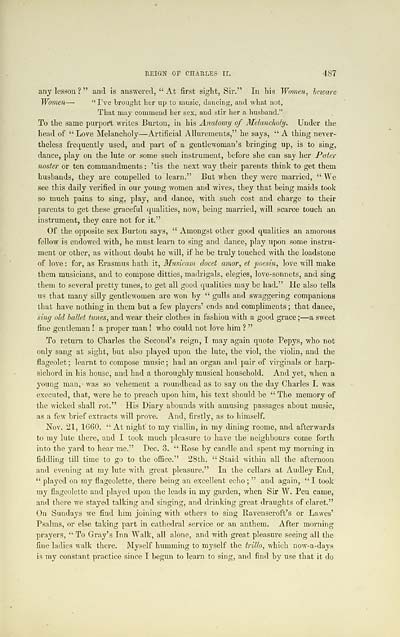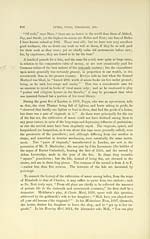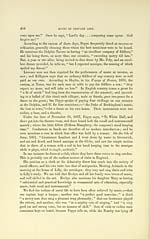Glen Collection of printed music > Printed text > Popular music of the olden time > Volume 2
(111) Page 487
Download files
Complete book:
Individual page:
Thumbnail gallery: Grid view | List view

REIGN OF CHARLES II. 487
any lesson?" and is answered, "At first sight, Sir." In his Women, beivare
Women — " I've brought her up to music, dancing, and what not,
That may commend her sex, and stir her a husband."
To the same purport writes Burton, in his Anatomy of Melancholy. Under the
head of " Love Melancholy — Artificial Allurements," he says, " A thing never-
theless frequently used, and part of a gentlewoman's bringing up, is to sing,
dance, play on the lute or some such instrument, before she can say her Pater
noster or ten commandments : 'tis the next way their parents think to get them
husbands, they are compelled to learn." But when they were married, " We
see this daily verified in our young women and wives, they that being maids took
so much pains to sing, play, and dance, with such cost and charge to their
parents to get these graceful qualities, now, being married, will scarce touch an
instrument, they care not for it."
Of the opposite sex Burton says, " Amongst other good qualities an amorous
fellow is endowed with, he must learn to sing and dance, play upon some instru-
ment or other, as without doubt he will, if he be truly touched with the loadstone
of love : for, as Erasmus hath it, Musicam docet amor, et poesin, love will make
them musicians, and to compose ditties, madrigals, elegies, love-sonnets, and sing
them to several pretty tunes, to get all good qualities may be had." He also tells
us that many silly gentlewomen are won by " gulls and swaggering companions
that have nothing in them but a few players' ends and compliments ; that dance,
sing old ballet tunes, and wear their clothes in fashion with a good grace ; — a sweet
fine gentleman ! a proper man ! who could not love him ? "
To return to Charles the Second's reign, I may again quote Pepys, who not
only sang at sight, but also played upon the lute, the viol, the violin, and the
flageolet ; learnt to compose music ; had an organ and pair of virginals or harp-
sichord in his house, and had a thoroughly musical household. And yet, when a
young man, was so vehement a roundhead as to say on the day Charles I. was
executed, that, were he to preach upon him, his text should he " The memory of
the wicked shall rot." His Diary abounds with amusing passages about music,
as a few brief extracts will prove. And, firstly, as to himself.
Nov. 21, 1660. "At night to my viallin, in my dining roome, and afterwards
to my lute there, and I took much pleasure to have the neighbours come forth
into the yard to hear me." Dec. 3. " Rose by candle and spent my morning in
fiddling till time to go to the office." 28th. " Staid within all the afternoon
and evening at my lute with great pleasure." In the cellars at Audley End,
" played on my flageolette, there being an excellent echo; " and again, "I took
my flageolette and played upon the leads in my garden, when Sir W. Pen came,
and there we stayed talking and singing, and drinking great draughts of claret."
On Sundays we find him joining with others to sing Ravenscroft's or Lawes'
Psalms, or else taking part in cathedral service or an anthem. After morning
prayers, " To Gray's Inn Walk, all alone, and with great pleasure seeing all the
fine ladies walk there. Myself humming to myself the trillo, which now-a-days
is my constant practice since I begun to learn to sing, and find by use that it do
any lesson?" and is answered, "At first sight, Sir." In his Women, beivare
Women — " I've brought her up to music, dancing, and what not,
That may commend her sex, and stir her a husband."
To the same purport writes Burton, in his Anatomy of Melancholy. Under the
head of " Love Melancholy — Artificial Allurements," he says, " A thing never-
theless frequently used, and part of a gentlewoman's bringing up, is to sing,
dance, play on the lute or some such instrument, before she can say her Pater
noster or ten commandments : 'tis the next way their parents think to get them
husbands, they are compelled to learn." But when they were married, " We
see this daily verified in our young women and wives, they that being maids took
so much pains to sing, play, and dance, with such cost and charge to their
parents to get these graceful qualities, now, being married, will scarce touch an
instrument, they care not for it."
Of the opposite sex Burton says, " Amongst other good qualities an amorous
fellow is endowed with, he must learn to sing and dance, play upon some instru-
ment or other, as without doubt he will, if he be truly touched with the loadstone
of love : for, as Erasmus hath it, Musicam docet amor, et poesin, love will make
them musicians, and to compose ditties, madrigals, elegies, love-sonnets, and sing
them to several pretty tunes, to get all good qualities may be had." He also tells
us that many silly gentlewomen are won by " gulls and swaggering companions
that have nothing in them but a few players' ends and compliments ; that dance,
sing old ballet tunes, and wear their clothes in fashion with a good grace ; — a sweet
fine gentleman ! a proper man ! who could not love him ? "
To return to Charles the Second's reign, I may again quote Pepys, who not
only sang at sight, but also played upon the lute, the viol, the violin, and the
flageolet ; learnt to compose music ; had an organ and pair of virginals or harp-
sichord in his house, and had a thoroughly musical household. And yet, when a
young man, was so vehement a roundhead as to say on the day Charles I. was
executed, that, were he to preach upon him, his text should he " The memory of
the wicked shall rot." His Diary abounds with amusing passages about music,
as a few brief extracts will prove. And, firstly, as to himself.
Nov. 21, 1660. "At night to my viallin, in my dining roome, and afterwards
to my lute there, and I took much pleasure to have the neighbours come forth
into the yard to hear me." Dec. 3. " Rose by candle and spent my morning in
fiddling till time to go to the office." 28th. " Staid within all the afternoon
and evening at my lute with great pleasure." In the cellars at Audley End,
" played on my flageolette, there being an excellent echo; " and again, "I took
my flageolette and played upon the leads in my garden, when Sir W. Pen came,
and there we stayed talking and singing, and drinking great draughts of claret."
On Sundays we find him joining with others to sing Ravenscroft's or Lawes'
Psalms, or else taking part in cathedral service or an anthem. After morning
prayers, " To Gray's Inn Walk, all alone, and with great pleasure seeing all the
fine ladies walk there. Myself humming to myself the trillo, which now-a-days
is my constant practice since I begun to learn to sing, and find by use that it do
Set display mode to: Large image | Transcription
Images and transcriptions on this page, including medium image downloads, may be used under the Creative Commons Attribution 4.0 International Licence unless otherwise stated. ![]()
| Special collections of printed music > Glen Collection of printed music > Printed text > Popular music of the olden time > Volume 2 > (111) Page 487 |
|---|
| Permanent URL | https://digital.nls.uk/91363326 |
|---|
| Shelfmark | Glen.254a |
|---|---|
| Additional NLS resources: | |
| Attribution and copyright: |
|
| Description | Scottish songs and music of the 18th and early 19th centuries, including music for the Highland bagpipe. These are selected items from the collection of John Glen (1833 to 1904). Also includes a few manuscripts, some treatises, and other books on the subject. |
|---|
| Description | The Glen Collection and the Inglis Collection represent mainly 18th and 19th century Scottish music, including Scottish songs. The collections of Berlioz and Verdi collected by bibliographer Cecil Hopkinson contain contemporary and later editions of the works of the two composers Berlioz and Verdi. |
|---|

